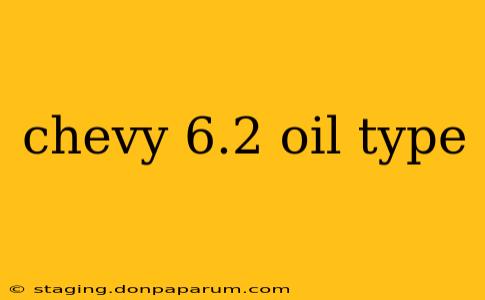Choosing the right oil for your Chevy 6.2L engine is crucial for maintaining its performance and longevity. This comprehensive guide will walk you through everything you need to know about selecting the appropriate oil type, viscosity, and other essential factors. We'll cover everything from factory recommendations to the nuances of different driving conditions and oil formulations.
Understanding Your Chevy 6.2L Engine's Oil Needs
The 6.2L engine, a powerhouse found in various Chevrolet vehicles, demands high-quality oil to withstand its robust performance. Ignoring the manufacturer's recommendations can lead to premature wear and tear, reduced fuel efficiency, and costly repairs.
Factory Recommendations: The Starting Point
Always begin by consulting your owner's manual. This document provides the most accurate and up-to-date information on the recommended oil type and viscosity for your specific year and model of Chevrolet vehicle equipped with the 6.2L engine. This is your primary source of truth and should be your first step in choosing the right oil.
The manual typically specifies an oil type, often expressed as a Society of Automotive Engineers (SAE) viscosity grade, and may also include specifications like API certifications (e.g., SN Plus, SP). Pay close attention to these details.
Decoding SAE Viscosity Grades
SAE viscosity grades indicate the oil's thickness at different temperatures. For example, a 5W-30 oil means it has a viscosity of 5 at low temperatures (W denotes winter) and 30 at higher operating temperatures. Your owner's manual will specify the recommended viscosity range for your 6.2L engine. Choosing an oil outside this range could compromise engine protection.
API Certifications: Ensuring Quality
The American Petroleum Institute (API) provides certifications that indicate an oil's performance capabilities. These certifications, such as SN Plus or SP, ensure the oil meets specific standards for engine protection against wear, sludge formation, and other potential issues. Look for the API certification symbol on the oil container to confirm it meets the required standards.
Beyond the Basics: Factors Influencing Oil Choice
While the owner's manual provides a solid foundation, several other factors can influence your oil choice:
Driving Conditions: Extreme Temperatures and Towing
- Extreme Temperatures: If you live in an area with extremely hot or cold temperatures, you might need to consider a different viscosity grade than what's recommended in the manual. Consult your owner's manual or a qualified mechanic for guidance.
- Heavy Towing or Hauling: Regularly towing heavy loads or hauling significant cargo puts extra stress on your engine. In such cases, using an oil with a higher viscosity or a high-performance formulation might be beneficial. Again, consult your owner's manual or a mechanic for advice tailored to your specific usage.
Oil Type: Conventional, Synthetic, or Synthetic Blend
- Conventional Oil: The most affordable option, but it may not provide the same level of protection or performance as synthetic oils, especially under extreme conditions.
- Synthetic Oil: Offers superior protection and performance, extending engine life and improving fuel efficiency. It's a more expensive option but can be cost-effective in the long run.
- Synthetic Blend: A balance between conventional and synthetic oils, providing a good compromise between cost and performance.
Maintaining Optimal Engine Health: Regular Oil Changes
Regardless of the oil type you choose, adhering to the recommended oil change intervals specified in your owner's manual is crucial. Regular oil changes help maintain engine cleanliness, prevent wear and tear, and ensure optimal performance.
Conclusion: Make Informed Choices for Peak Performance
Selecting the right oil for your Chevy 6.2L engine is a critical aspect of vehicle maintenance. By carefully reviewing your owner's manual, understanding SAE viscosity grades and API certifications, and considering your driving conditions, you can make informed choices that contribute to your engine's long-term health and performance. Remember, consulting a qualified mechanic is always recommended if you have any doubts or specific concerns about your vehicle's oil requirements.

